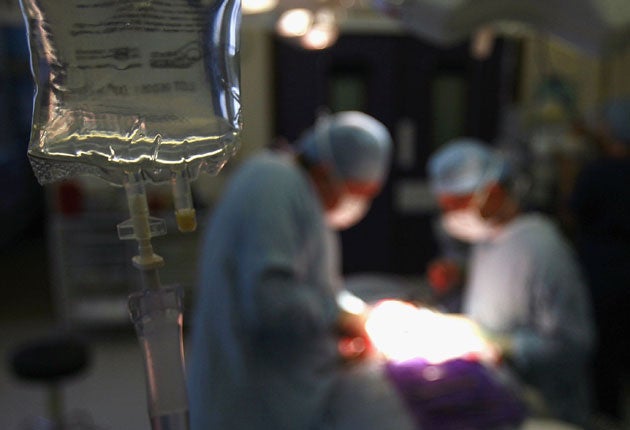Doctors accused of skimming health funds
Insurer says 'tens of millions' falsely claimed

Your support helps us to tell the story
From reproductive rights to climate change to Big Tech, The Independent is on the ground when the story is developing. Whether it's investigating the financials of Elon Musk's pro-Trump PAC or producing our latest documentary, 'The A Word', which shines a light on the American women fighting for reproductive rights, we know how important it is to parse out the facts from the messaging.
At such a critical moment in US history, we need reporters on the ground. Your donation allows us to keep sending journalists to speak to both sides of the story.
The Independent is trusted by Americans across the entire political spectrum. And unlike many other quality news outlets, we choose not to lock Americans out of our reporting and analysis with paywalls. We believe quality journalism should be available to everyone, paid for by those who can afford it.
Your support makes all the difference.Tens of millions of pounds are being skimmed off bills for private health care by dishonest doctors and hospitals, according to a leading private health insurer.
Norwich Union Healthcare said hospital consultants were chiefly to blame for overcharging for private work, claiming for more complex procedures than they performed, or carrying out unnecessary treatment.
In one case, £85,000 was recovered from a consultant gastroenterologist, Navneet Ahluwalia, of Cheadle in Greater Manchester, who had submitted fraudulent claims to a number of private health insurance companies.
In another case, a consultant gynaecologist, Christopher Hutchins, from Nuneaton, claimed for operations that were impossible as they were on body parts that had already been removed.
Although only a minority of doctors was involved, the fraud was depriving other patients of resources and pushing up the cost of premiums.
Launching a counter-fraud programme, Simon Arnold, Norwich Union's director of customer health care, said improved monitoring of payments had enabled the company to spot unusual patterns of payments and detect fraud that may have escaped noticed in the past. "We want to try to stamp out the abuse," he said. "We are talking about £100 here and £50 there that builds up over time, not just the £10,000 fraud. It is time for us to make a concerted effort and now we are able to spot the patterns."
Mr Hutchins was exposed after charging for procedures he had not carried out and for splitting other procedures into several parts, and claiming an additional fee for each. In one instance he submitted 22 invoices for a course of treatment that should have been billed as a single procedure.
Mr Hutchins was struck off the medical register by the General Medical Council (GMC) in 2003 after a disciplinary panel found he had failed to be honest and trustworthy. Tens of thousands of pounds were recovered from him for fraudulent charges to private health insurers.
Dr Ahluwalia was found to have "upcoded" procedures, claiming for a more complex one than the one actually performed. In one example, he carried out a diagnostic endoscopy, in which a flexible telescope is inserted into the stomach as part of an examination, but claimed for a therapeutic endoscopy in which surgical treatment is carried out. Dr Ahluwalia was reported to the GMC and suspended from the medical register for one year in March 2008, following Norwich Union's investigations, after the GMC disciplinary panel ruled his actions were "misleading and dishonest". He carried out the fraud as a part of his private practice at the Alexandra Hospital in Cheadle, defrauding Bupa of £32,000, Axa of more than £22,000, Norwich Union of £15,573 and Western Provident Association of £13,937.
Norwich Union has hired Jim Gee, director of fraud services at KPMG, to spearhead its anti-fraud drive. Mr Gee previously helped the NHS recover £800m in fraudulent claims as head of the NHS counter-fraud service.
Norwich Union said that, in some cases, patients were submitted to unnecessary treatment by unscrupulous doctors to trigger extra payments. Where a patient was being checked for cancer and a lump in her breast was found to be benign , it would be a matter of clinical judgement whether to remove it. Checks would be made on a consultant who consistently removed benign lumps.
Join our commenting forum
Join thought-provoking conversations, follow other Independent readers and see their replies
Comments